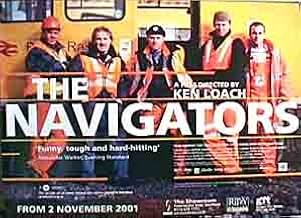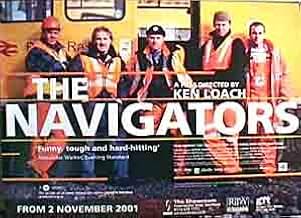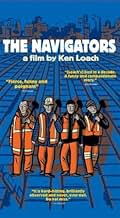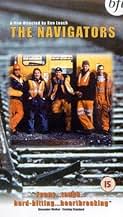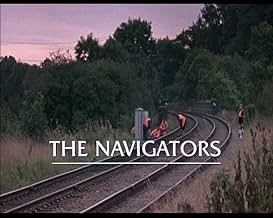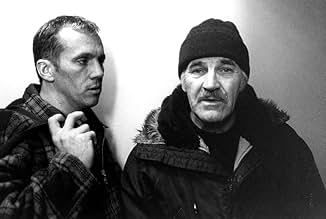IMDb-BEWERTUNG
6,9/10
3234
IHRE BEWERTUNG
Füge eine Handlung in deiner Sprache hinzuFive Yorkshiremen try to survive after the British Rail is bought out by a private company.Five Yorkshiremen try to survive after the British Rail is bought out by a private company.Five Yorkshiremen try to survive after the British Rail is bought out by a private company.
- 1 BAFTA Award gewonnen
- 3 Gewinne & 3 Nominierungen insgesamt
Thomas Craig
- Mick
- (as Tom Craig)
Angela Forrest
- Tracy
- (as Angela Saville)
Empfohlene Bewertungen
Ken Loach is known for his political/social films. This one is no different. The story of the consequences of the privation of British Rail is told through the eyes of the simple workers. They are the one who suffer the most from it. Loach is very sympathetic to them and doesn't hide it. In his opinion they are the "good guys". He tells their story with humor which draw us to their side. There is nothing wrong about that because he is right, they are the good guys.
Loach is also cleverly draw the impact privation have on the safety matters in this case and the unnecessary death it brings. As usual Loach uses a lot of non-professional actors and they do a very good job and we feel very close to them because they seem real and the problems they are facing seem also real.
This is a good film. No fireworks here, but a solid piece of work. The ending is a bit of disappointment, because it hangs in the air with no conclusion. And sometime all we need is a solid film. Just go and see it.
Loach is also cleverly draw the impact privation have on the safety matters in this case and the unnecessary death it brings. As usual Loach uses a lot of non-professional actors and they do a very good job and we feel very close to them because they seem real and the problems they are facing seem also real.
This is a good film. No fireworks here, but a solid piece of work. The ending is a bit of disappointment, because it hangs in the air with no conclusion. And sometime all we need is a solid film. Just go and see it.
Marvelous film set in South Yorkshire, using local actors and comedians, done not so much in a documentary style, but with a documentary feel, about a group of railroad track workers during the privatization of British Rail. The culture changing from one of unionized steady jobs, to one of freelancing with no health care or holidays and for the sake of economy, stretching security which leads to the death of one of the workers. This presumably low budget film, shot all on location, is gritty, real, and is a wonderful insight into the British working class and its humor. A real treasure.
The fact that the previous reviewer apparently had other problems on her mind at the time should not dissuade anyone from seeing this excellent example of Ken Loach's work.
The fact that the previous reviewer apparently had other problems on her mind at the time should not dissuade anyone from seeing this excellent example of Ken Loach's work.
10Jose E
This is by no means a movie to be seen for pure entertainment,. This is a REALISTIC movie, so those looking for kicks stay away. Otherwise you will be so disappointed.
I like this movie so much, especially since is the type of movie Hollywood would NEVER make. It sharply portraits how bad working conditions have gotten over the years (which is something I have witnessed firsthand). Treating people like dirt and firing them without a reason have become an end it itself.
Watching this film takes you to the core of what's going on at most workplaces, which obviously won't delight those who think life is pretty, because it ain't. Put your feet on the ground and search for that beauty - you are not going to find it in the treatment workers are getting anywhere. This is the real world, people, whether we like it or not.
While seeing this movie, never did I feel I was in the cinema. I could relate to what the characters were going through.
Of course the movie has no happy end, but if it did would be unreal.
10/10.
I like this movie so much, especially since is the type of movie Hollywood would NEVER make. It sharply portraits how bad working conditions have gotten over the years (which is something I have witnessed firsthand). Treating people like dirt and firing them without a reason have become an end it itself.
Watching this film takes you to the core of what's going on at most workplaces, which obviously won't delight those who think life is pretty, because it ain't. Put your feet on the ground and search for that beauty - you are not going to find it in the treatment workers are getting anywhere. This is the real world, people, whether we like it or not.
While seeing this movie, never did I feel I was in the cinema. I could relate to what the characters were going through.
Of course the movie has no happy end, but if it did would be unreal.
10/10.
England. Mid 1990's. British Rail has been privatised and broken up into separate companies with all work put out to tender with the lowest bidder getting the job. This film follows a group of workers in a Yorkshire depot as the culture gradually changes from a world of union influence into a competitive business world.
This is a very sobering film - it deals with the railtrack situation but is more generally about the selling out of the working man and the beginning of the culture that views people as commodities and expenses, just like the rolling stock and the rails. The film opens with the boss of the depot announcing that the company has been privatised and that things will begin to change. It then follows the culture change over the course of time and concludes with a depressingly innocuous exchange that represents the shattering of previously unified spirits.
The culture change beings with mission statements, competing with work and setting levels for "acceptable deaths and continues with an end to previous agreements and a range of different companies. It is very hard to watch without being angry at the treatment of previously proud men as they are reduced to being costs. Workers are offered voluntary redundancy and those that refuse are gradually forced out. Bosses and chief execs identify those workers that have union ties and work to push them out. Workers are encouraged to join temp agencies at higher wages but without benefits or a steady work load thus saving the company money. Those that make trouble with the crews by insisting on safe working conditions etc are blackballed by the agencies and no more work is put their way. The pressure to cut costs to win jobs continues until unskilled workers are used for rail maintenance because they are paid cash in hand while other crews are forced to use "cost-effective" methods to work without a lookout and run the risk of severe accidents.
For those who think that the experiences of the workers are exaggerated for effect, Ken Loach received regular visits from railtrack workers (taking holidays or sick days) to advise on the film to make sure that it was representative of their experiences - they couldn't officially do it as they feared being blacklisted within the company. These things do go on - the rail companies are led by bosses who get huge bonuses from the shareholders as they drive down operating costs by compromising safety and reducing the workforce costs.
If the film has a major flaw it is the one-sided nature of the script. Workers are all represented as jovial, hardworking types, you know - salt of the earth, put down by bosses who only care about money. The latter may well be true but the way the workers constantly joke etc makes them look too good and the film has far too much sympathy for them for it's own good. Even when a group of workers do something completely abhorrent (the end of the film) it is presented as something that they had no choice about whereas really they should have carried some of the blame.
This film was released in Europe but only had a limited release in the UK as it was screened first on TV. It came shortly after the collapse of Railtrack as the Government put it into administration. It was screened days after the Government tried to cover up a report of failing train performances etc and it was screened as inquiries continue into serious derailments with significant loss of life.
In the UK one major accident killed many passengers and was put down to badly maintained rails. The Chief Exec has thus far escaped charges of manslaughter (despite the findings of the Health & Safety Executive) and also left his job with his huge contractually-obliged bonus, before moving on to another job on another board. For those who think that this film is exaggerated you truly have no idea what's going on in the world of big business.
As the Government continue plans for part privatisation of the London Underground and have further plans to privatise air traffic control this film is a very scary thing. Once we forget the people who make up workforces that only leave numbers. When shareholders become more important than the public and the workers then costs are all that matters and all corners are cut to boost the share price.
This film has it's flaws and will not change Government policy one bit. But this is a very sobering film that will open you eyes to what is done to satisfy shareholders and earn bonuses for upper management.
This is a very sobering film - it deals with the railtrack situation but is more generally about the selling out of the working man and the beginning of the culture that views people as commodities and expenses, just like the rolling stock and the rails. The film opens with the boss of the depot announcing that the company has been privatised and that things will begin to change. It then follows the culture change over the course of time and concludes with a depressingly innocuous exchange that represents the shattering of previously unified spirits.
The culture change beings with mission statements, competing with work and setting levels for "acceptable deaths and continues with an end to previous agreements and a range of different companies. It is very hard to watch without being angry at the treatment of previously proud men as they are reduced to being costs. Workers are offered voluntary redundancy and those that refuse are gradually forced out. Bosses and chief execs identify those workers that have union ties and work to push them out. Workers are encouraged to join temp agencies at higher wages but without benefits or a steady work load thus saving the company money. Those that make trouble with the crews by insisting on safe working conditions etc are blackballed by the agencies and no more work is put their way. The pressure to cut costs to win jobs continues until unskilled workers are used for rail maintenance because they are paid cash in hand while other crews are forced to use "cost-effective" methods to work without a lookout and run the risk of severe accidents.
For those who think that the experiences of the workers are exaggerated for effect, Ken Loach received regular visits from railtrack workers (taking holidays or sick days) to advise on the film to make sure that it was representative of their experiences - they couldn't officially do it as they feared being blacklisted within the company. These things do go on - the rail companies are led by bosses who get huge bonuses from the shareholders as they drive down operating costs by compromising safety and reducing the workforce costs.
If the film has a major flaw it is the one-sided nature of the script. Workers are all represented as jovial, hardworking types, you know - salt of the earth, put down by bosses who only care about money. The latter may well be true but the way the workers constantly joke etc makes them look too good and the film has far too much sympathy for them for it's own good. Even when a group of workers do something completely abhorrent (the end of the film) it is presented as something that they had no choice about whereas really they should have carried some of the blame.
This film was released in Europe but only had a limited release in the UK as it was screened first on TV. It came shortly after the collapse of Railtrack as the Government put it into administration. It was screened days after the Government tried to cover up a report of failing train performances etc and it was screened as inquiries continue into serious derailments with significant loss of life.
In the UK one major accident killed many passengers and was put down to badly maintained rails. The Chief Exec has thus far escaped charges of manslaughter (despite the findings of the Health & Safety Executive) and also left his job with his huge contractually-obliged bonus, before moving on to another job on another board. For those who think that this film is exaggerated you truly have no idea what's going on in the world of big business.
As the Government continue plans for part privatisation of the London Underground and have further plans to privatise air traffic control this film is a very scary thing. Once we forget the people who make up workforces that only leave numbers. When shareholders become more important than the public and the workers then costs are all that matters and all corners are cut to boost the share price.
This film has it's flaws and will not change Government policy one bit. But this is a very sobering film that will open you eyes to what is done to satisfy shareholders and earn bonuses for upper management.
Saying frankly, I did not enjoy, nor being moved by the movie. The story is neither dramatic nor exciting. The lead character is not well defined and thus easy to confuse the audience. After watching it, being little bit disappointed, I went out to walk my dog, but the movie occupied my thought even after I came home. This is a story in railway workers in the UK, however I could see similar situation in Japan too. In Japan, many companies are gradually recovering from serious downfall. But during the process of profit recovery, companies have replaced fixed-cost employees by variable cost contract workers. As a result, the lifetime employment system has collapsed, and the power of the unions, the members of which are employees only, have been eroding. At the same time, number of contract workers, who do not have systematic training and skills building, has increased. In this trend the gap between peoples of high wages and low wages are becoming wider. British society has been many years the forerunner in the world of winning the rights of workers. But these rights are now too easily forgotten under the pressure of global economy. This is a social crisis in longer term. At least this movie has succeeded to portray this crisis.
Wusstest du schon
- PatzerThe vest that John wears in the beginning (with the meter) and end (their last job), is actually a British Rail safety vest, over his Gilchrist coat (when he moves you can see the gray on it). He has the combination on before the company is renamed Gilchrist Engineering.
- VerbindungenReferenced in Es war einmal ..: Moi, Daniel Blake (2021)
Top-Auswahl
Melde dich zum Bewerten an und greife auf die Watchlist für personalisierte Empfehlungen zu.
- How long is The Navigators?Powered by Alexa
Details
- Erscheinungsdatum
- Herkunftsländer
- Offizielle Standorte
- Sprache
- Auch bekannt als
- The Navigators
- Drehorte
- Produktionsfirmen
- Weitere beteiligte Unternehmen bei IMDbPro anzeigen
Box Office
- Bruttoertrag in den USA und Kanada
- 3.052 $
- Eröffnungswochenende in den USA und in Kanada
- 1.940 $
- 23. Feb. 2003
- Weltweiter Bruttoertrag
- 1.807.686 $
- Laufzeit
- 1 Std. 36 Min.(96 min)
- Farbe
- Sound-Mix
- Seitenverhältnis
- 1.85 : 1
Zu dieser Seite beitragen
Bearbeitung vorschlagen oder fehlenden Inhalt hinzufügen

